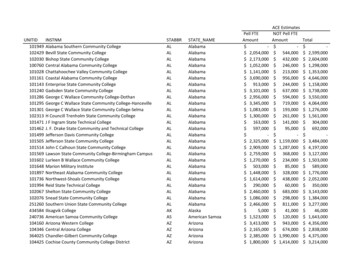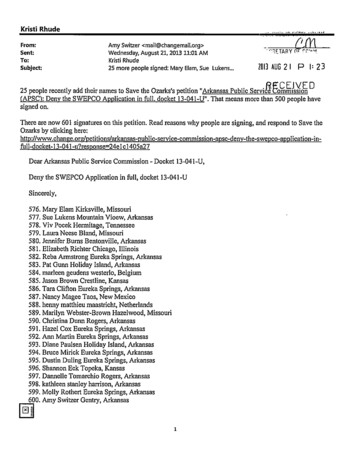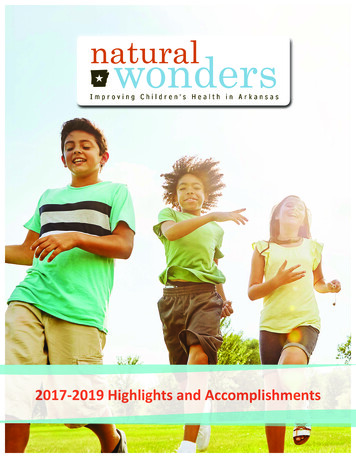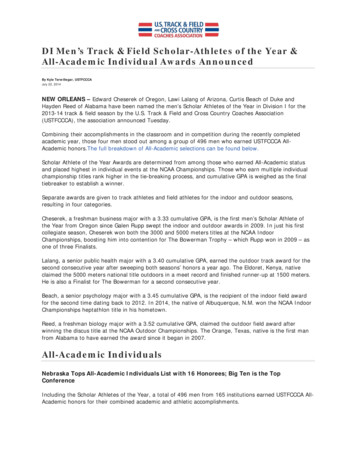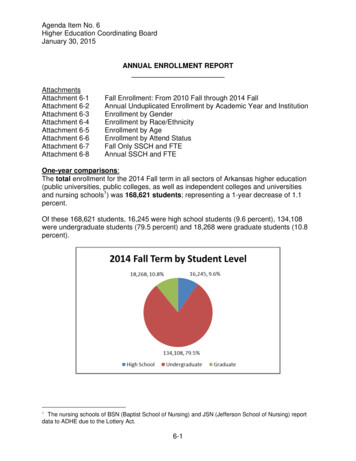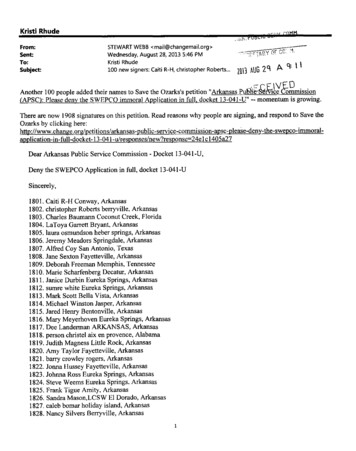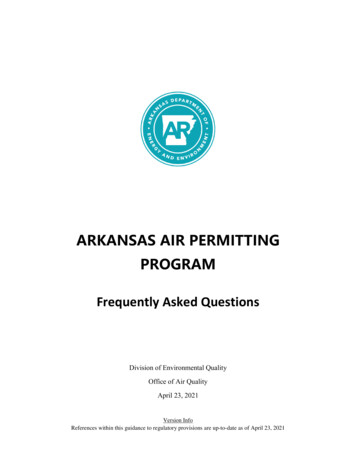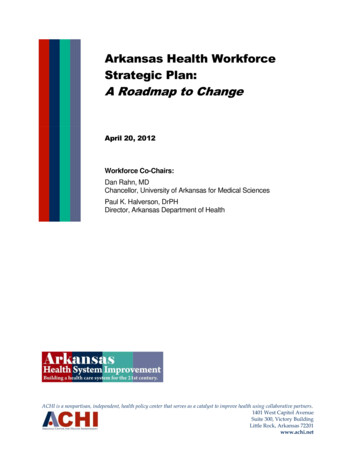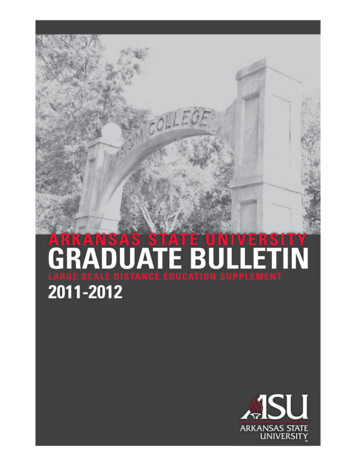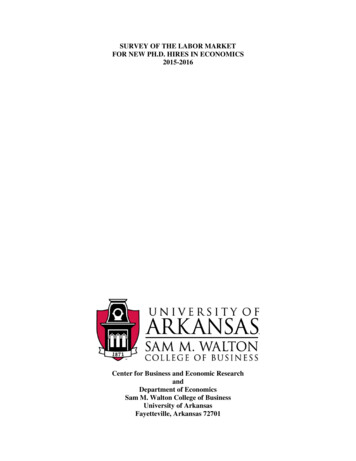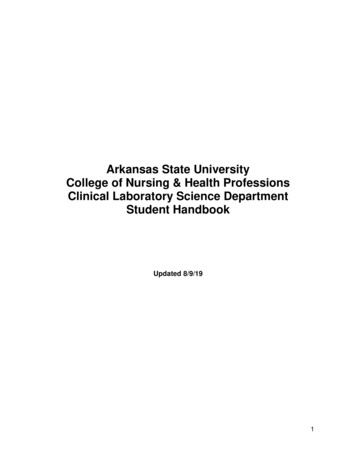
Transcription
Arkansas State UniversityCollege of Nursing & Health ProfessionsClinical Laboratory Science DepartmentStudent HandbookUpdated 8/9/191
Table of ContentsINTRODUCTION . 3FACULTY/STAFF . 3HISTORY . 4MISSION STATEMENT . 4GOALS OF THE CLS DEPARTMENT . 4GENERAL POLICIES AND REGULATIONS . 5Academic advising. 5Academic integrity policy . 6Academic retention policy . 9Admission procedure . 9*Attendance policy . 9Cell phones and electronic devices .10Certification exam (ASCP) .11*Clinical rotations & service work policy .11*College code of honor policy .12*Confidentiality contract .12CPR certification .13Disability services .13Dress code .13*Essential requirements and functions in Clinical Laboratory Science .14Grading system .15Graduation .16Grievance .16Health Insurance .16Infection Control .16Laboratory safety .16Malpractice Insurance .17Professionalism .17*Record release.17Social Media Policy .17*Substance abuse testing .18Tobacco policy .182
TB mask fitting.19Tuberculin skin test.19Withdraw/repeat policy .19Vaccinations .19Required signature forms .20INTRODUCTIONArkansas State University (ASU) offers both an Associate of Applied Science and aBachelor of Science degree in Clinical Laboratory Science (CLS). Upon completion ofthe prescribed curriculum for these programs, the graduate is eligible to take thenational certifying examination for Medical Laboratory Scientist (MLS) and MedicalLaboratory Technician (MLT) offered through the American Society of ClinicalPathologists (ASCP) Board of Certification (BOC).The curriculum of the Clinical Laboratory Science program permits students to achievethe status of a Medical Laboratory Technician (Associate of Applied Science degree)through a 2 ½ year program. These students have the option of continuing theireducation and completing a baccalaureate degree to become a Medical LaboratoryScientist in two additional years.The Clinical Laboratory Science Programs at Arkansas State University are accreditedby the:National Accrediting Agency for Clinical Laboratory Sciences (NAACLS)5600 N. River Rd., Suite 720Rosemont, IL 60018-5119Phone: 773 - 714 - 8880Internet: http://www.naacls.orgEmail: info@naacls.orgFACULTY/STAFFDr. Stacy Walz, Chair and Associate Professor of CLSMr. Claude Rector, Assistant Professor of CLSMrs. Annette Bednar, Assistant Professor of CLSMs. Audrey Folsom, Temporary Full-Time Assistant Professor of CLSMr. David Lovelace, Project/Program AssistantMr. Edwin Wallace, Pre-Professional AdvisorMs. Kelly Sabin, Administrative Assistant3
HISTORYThe Clinical Laboratory Science Program was initiated in 1976 as a Medical TechnologyProgram on the ASU campus as a part of the Biology Department, when St. Bernard'sMedical Center closed its program. Prior to that time, the program was a cooperativeagreement between Arkansas State University and St. Bernard's Medical Center. In1982, the Program was transferred to the newly formed College of Nursing and HealthProfessions. The BS Program from the time it began on the ASU campus in 1976 wasrecognized and accredited by NAACLS. In 1986, the two-year Clinical LaboratoryTechnician/Medical Laboratory Technician Program was started. These two Programshave continued under full NAACLS accreditation. These programs are designed toprovide skilled and competent health care professionals who can serve the needs of thecitizens of the state of Arkansas. Over the past three decades, the Arkansas StateUniversity Clinical Laboratory Science Programs have achieved an excellent reputationwith the hospitals and clinics of northeast Arkansas and bordering states.MISSION STATEMENTThe purpose of the Clinical Laboratory Science Programs is to provide varied and richeducational experiences that foster the theoretical knowledge and technical skillsnecessary for graduates to provide quality laboratory services in accordance withnationally accepted standards.The programs provide fully integrated associate and baccalaureate degrees that allowstudents to enter and exit the two levels with a minimum of repetition. The associatedegree level provides educational experiences resulting in the basic theoreticalknowledge and technical skills necessary to function as clinical laboratory technicians.The baccalaureate degree level builds upon the foundations provided by the associatedegree level to provide comprehensive and in-depth educational experiences necessaryfor the decision making and problem solving required for function as clinical laboratoryscientists.In accordance with the mission of the university, educational experiences includeopportunities for critical thinking, effective and logical communication, and use of currenttechnology and other resources to allow students to expand and apply their knowledge.GOALS OF THE CLS DEPARTMENTThe overarching goal of the Clinical Laboratory Sciences Department at ASU is toprovide educational experiences that produce clinical laboratory professionals with thetheoretical knowledge and technical skills necessary to perform high quality clinicallaboratory testing in accordance with nationally accepted standards.4
The specific goals of this department are:1. For their respective levels of practice, produce AAS and BS clinical laboratorygraduates who are proficient in the pre-analytical, analytical, and post-analyticalcomponents of the primary disciplines of the laboratory:A. HematologyB. HemostasisC. ChemistryD. Microbiology (including Parasitology, Virology, and Mycology)E. UrinalysisF. MicroscopyG. Molecular DiagnosticsH. ImmunologyI. ImmunohematologyJ. Quality Assurance2. Instill principles of professionalism, ethics, team-building, and interdisciplinarycommunication in all CLS students.3. Apply laboratory safety standards and adhere to governmental regulations as appliedto the practice of clinical laboratory science.4. Produce graduates who are successful in passing the ASCP-BOC certificationexamination at their respective level.5. Maintain CLS program accreditation with NAACLS.GENERAL POLICIES AND REGULATIONS (in alphabetical order)NOTE: Policies with a star (*) to the left have an associated form to sign at the end ofthe handbook. Completed, signed forms need to be submitted to the CLS departmentaloffice before classes begin. Policies and regulations are subject to change.Academic advisingOnce admitted to the AAS or BS Program in CLS, each student is assigned a CLSfaculty advisor who will work with the student to plan their orderly progression throughthe curriculum. Advisees must meet with their advisors prior to registration for classes.Students are ultimately responsible for their own education. Each student is providedwith a curriculum plan which clearly outlines the requirements of the program. It is theresponsibility of the student to know and follow the requirements, policies, andprocedures contained in this handbook.Students should contact their advisor before making changes in their class schedule.5
Academic integrity policyThe College Student Academic Honor Code exists in addition to the University Code ofConduct and the Academic Integrity Policy found in the Student Handbook. Anacademic honor offense by the college code is defined as an act of lying/willfulmisrepresentation, cheating/unauthorized collaboration, plagiarism, or facilitatingacademic dishonesty of others. These terms are defined as follows:Lying/willful misrepresentation - a false statement (written or oral) made with thedeliberate intent to deceive; something intended to or serving to convey a falseimpression. Fabricating quotations and/or sourcesFabricating, dishonestly adjusting, omitting, or otherwise misrepresentingresearch results and records, including information, data, statistics, researchfacts, and its analysisEngaging in selective reporting or omission of conflicting data for deceptivepurposesAltering graded work, then resubmitting it for a new gradeProviding false information about reasons for class absences or late work whenrequesting a make-up quiz or exam or an extension for homeworkSubmitting the same paper in more than one class without the approval of theinstructors involvedSubmitting a paper from a previous semester for a current class without theapproval from the instructorFailing to provide required or requested information regarding academicperformance or enrollments at previous institutionsIntentionally obstructing or interfering with other students’ academic work, orotherwise undertaking activity with the purpose of creating or obtaining an unfairacademic advantage over other students’ academic work.Altering documents affecting academic records, such as falsifying information onan official academic document, form, grade report, letter of permission, clinicalrecord, student ID cards, or any other official document.Providing false information to others about academic performance, leadershipactivities, or membership in student organizations.Falsification of information recordsRecording hours not actually workedSubmitting an altered or fabricated preceptor evaluationAltering a score, grade, or schedule change on an academic record.Forging the signature of an instructor, advisor, dean, or another student withoutproper authorizationCreating false university, college, or other official correspondences (such asmedical documentation)6
Cheating/unauthorized collaboration - to practice fraud or deceit; academic fraud is aform of cheating and includes such things as plagiarism (including Internet resources),false citation, false data and submission of the same work to fulfill academicrequirements in multiple classes. Using notes, books, calculators, phones, photos, computers, websites, tweets,social media, or other aids during a quiz or an exam when not allowed by theinstructorTalking during a quiz or exam when told by the instructor talking is not permittedLooking at another student’s exam or quiz during the testing periodContinuing to work on a quiz or exam after the instructor has notified studentsthat time for the test has endedIgnoring the guidelines specified by the instructor for an assignment or for a “takehome” test and instead using materials or study aids that the instructor hasforbiddenReceiving help with homework, reports, labs, paper, data collection, or otheractivities when not allowed by the instructorAccepting credit for a group project without doing your share of the workHelping others with their homework or other assignments when not allowed bythe instructorAllowing others to view your answers or copy part of your homework, lab, quizanswers, exam answers, or other related work when not permitted to do so bythe instructorA group doing another student’s work on a group project, lab, presentation,report, or other activity while presenting the work as if done by the entire groupequallyPlagiarism – as defined in the 1995 Random House dictionary is the “use or closeimitation of the language and thoughts of another author and the representation of themas one’s own original work.” Within academia plagiarism is considered academicdishonesty or academic fraud and offenders are subject to a number of penaltiesincluding course failure or other severe consequences. Using the words, sentences, arguments, rhetorical structures, and ideas ofanother without proper citation and acknowledgementCopying data, facts, graphs, computer programs, spreadsheets, images, photos,film/video, or other materials and using them without proper citation oracknowledgementCopying homework, quiz, or exam answers from an answer key, solution manual,textbook, web site, or other items from another student, thus presenting another’swork as your ownFailing to use quotation marks properly or when neededFailing to give a source for quoted materialsFailing to paraphrase language completelyFailing to give a source for paraphrases7
Failing to cite sources correctly and completelyFacilitating Academic Dishonesty of Others – intentionally or knowingly helpingor attempting to help others commit an act of academic dishonesty. Writing a paper for another studentAllowing another student to use your past homework assignments, paper, labs,or similar itemsSharing homework with another student when told collaboration is not allowedAllowing or helping another student to look at your exam or quiz during a testSharing with other students your notes, books, calculators, phones, photos,computers, web sites, tweets, social media, or other aids during a quiz or anexam when not allowing by the instructorCompleting another student’s exam or quiz by filling in the student’s scantroncard or other answer sheet or by attending the exam in place of the other studentProviding any materials, information, or assistance to another person with theknowledge or reasonable expectation that such would be used for dishonestpurposesStealing, reproducing, circulating, or otherwise gaining access to a quiz, exam, orhomework materials prior to the time authorized by an instructorThese academic honor code violations apply whether they are performed individually orin groups. They apply to didactic, laboratory and clinical experiences of the program.PROCEDURES:If a student is aware of an honor offense, he/she should report that offense to either thefaculty member of the class in question, the program director or the department chair.An investigation will result.If there is evidence to bring forward, the student will be notified, in writing, of the specificcharges, who the hearing body will be and the time and place of the hearing. Suchnotification will be delivered at least two working days in advance of the hearing. Thedate of the hearing, if possible, must be set within 10 working days from the date ofnotification to the student.The College Code of Ethics Committee will hear the case. The Ethics Committee iscomprised of five CNHP student representatives and two CNHP faculty appointed bythe dean. Actions by the Ethics Committee may include: 1) dismissal of the case, 2)sanction the student, 3) refer the case to the Dean of Students, Student Affairs.Disciplinary sanctions by the committee may include educative, reprimand, restrictionsand restitution. The committee does not have the authority to suspend or expel thestudent.Student rights in this committee process are outlined in the ASTATE Student Handbookunder the caption "Disciplinary Hearings". The student is entitled to one appeal8
rendered by the Associate Dean for Judicial Affairs. The process for appeal is in thesection on "Appeal Process”.Academic retention policyCLS students must demonstrate competency and in-depth knowledge andunderstanding of the key concepts specific to the practice of clinical laboratory science.Therefore, strict policies are placed upon student academic performance in all CLScourses and practicums. CLS student records are reviewed by the CLS ProgramRetention Committee at the end of each semester. A minimum grade of “C” is requiredin each CLS course and practicum. A cumulative GPA of 2.0 is required for graduation.Students who earn less than a “C” in a CLS course are unable to matriculate in the CLSProgram. Steps for continued matriculation are:(1) The student must repeat the course the next time the course is offered, and earn a“C” or better upon repeating the course. If a grade of “C” or better is not earned uponrepeating the course, the student is dismissed from the CLS Program and is unable toreapply.(2) If the student successfully repeats the course, he/she must re-apply to the CLSProgram. Readmission is based upon space available, using the standard admissionsscoring process.(3) The student is unable to enroll in other CLS courses until officially readmitted to theCLS Program.If the student earns less than a “C” in a CLS practicum, the student is not allowed torepeat the practicum, is dismissed from the CLS Program, and is unable to reapply.Admission procedureAdmission to ASU is not sufficient to be admitted to any of the professional programs inthe College of Nursing and Health Professions, and CLS is no different. Applications foradmission to the professional CLS program are accepted each year until April 15.Students are notified of their status (admitted, denied, waiting list) by May 1. Uponadmission, students may begin taking professional CLS courses the subsequent fallsemester.Detailed admission requirements and application materials can be found on thedepartmental website.*Attendance policyClinical Laboratory Science (CLS) is a professional program designed to providestudents with the knowledge, skills and attitudes to practice as Clinical Laboratory9
Scientists. As such, it is essential that students attend and participate in all courses,both lecture and laboratory.1.Students are required to attend all CLS courses, lectures, laboratories, clinicalrotations and seminars. Please arrange your schedule so that you are present,punctual and attentive.2.Absences will be excused only for illness or personal emergencies. Students areto notify the instructor(s) of the course(s) prior to class time. Additionally,students on clinical rotations must notify their supervisor prior to the expectedstarting time.- If 2 or more days are missed due to illness, a doctor’s note is required.3.Students are held responsible for information covered while absent. In mostcases, laboratory exercises cannot be made up, and the student earns a zero (0)for each missed laboratory exercise.4.All absences are documented. Unexcused absences and tardiness areunacceptable. The professionalism component of the course grade will beaffected, based on the number of violations.5.Over the course of the semester, students may miss no more than twice thenumber of lectures or laboratory sessions normally scheduled during a week.Students who miss more than the maximum number of class meetings will berequired to withdraw from the course or assigned a grade of “F”.6.Students needing special accommodations due to class conflicts with religiousobservances or athletic team events must notify course instructors within the firsttwo weeks of class.Cell phones and electronic devicesCell phones and other electronic devices may not be audible in the classroom. If yourphone rings during class, you will be asked to leave and not return. Family emergencycalls can be routed through the departmental office. Personal texting in class isprohibited. Using devices to cheat on tests and papers is a violation of the Honor Code.Cell phones are not allowed in the clinical setting. Use of any personal electronic deviceto store/enter any type of patient information is a violation of the Healthcare InformationPortability Accessibility Act of 1996 (HIPAA). Cell phones and other electronic devicesmay be used as a student resource at the discretion of the faculty member or preceptor.Taking unauthorized photographs in clinical settings is strictly prohibited.10
Use of smart watches in the clinical setting or in the classroom should be limited oravoided. It is a distraction to the student wearing it, and to the students around them.Cell phones are not allowed in campus laboratories, and cannot be used as timers orcalculators. Cell phones may become contaminated with bacteria, viruses, blood orbody fluids, and be carried home with students. Timers and calculators that stay in thelaboratory will be provided for student use.Violation of any of these policies may lead to a grade of F and/or dismissal from theprogram. Students violating the policy will be referred to the department chair. Studentsare expected to conduct themselves in a manner which promotes a collegiate learningenvironment. Behaviors and attitudes which disrupt the learning environment will not betolerated.Certification exam (ASCP)Upon graduation from one of ASU’s CLS Program, students are eligible to becomecertified by the American Society for Clinical Pathology (ASCP), as a MLT/CLT (for theAAS graduates) or as a MLS/MT/CLS (for the BS graduates).Certification through ASCP means that you are nationally certified to work as a medicallab professional. Licenses are state-specific, and right now, only 12 states requirelicenses to practice as a medical lab professional. The good news is that these 12states will accept the ASCP certification as proof that you are eligible to get a license.Tennessee and Louisiana are nearby states that already require licenses, and manyother states in the U.S. are working towards it (Missouri is very close to requiring it).The CLS Program faculty strongly recommend that students take the ASCP certificationexam shortly after graduating from ASU. Although students have up to five years postgraduation to sit for the exam, we recommend that students take it very soon aftergraduation when all the information is fresh in one’s head. Lack of certification limitsone’s employment opportunities in the future. With several states in the area requiringlicenses, it makes sense to have the ASCP certification so a license to practice can beobtained. Also, many hospitals and clinics will refuse to hire uncertified individuals.For information regarding how to register to take the exam, please go to the ASCPwebsite address: http://www.ascp.org/Board-of-CertificationBecause ASU graduates have completed an accredited program of study, they meet therequirements to sit for the exam via “Route 1”. ASU’s CLS Program code is 003012,which is needed to sign up for the exam.*Clinical rotations & service work policyAs part of the professional degree program, students are required to enroll in clinicalrotations at various sites and locations prior to graduation. Students are not financially11
compensated for clinical rotations by either Arkansas State University or the entity whooperates the site and location where these clinical rotations take place.Students may perform service work, which is the opportunity to work in the clinicallaboratory at one of clinical sites. Service work is non-compulsory (voluntary), pays anhourly salary, takes place before or after clinical rotation hours, and cannot overlap withclinical rotation hours. Students are never to be used as replacement of clinical staffwhile performing service work.Students will not be placed for clinical rotations at the site where they are employed.Additional information specific to clinical rotations may be found in the CLS ClinicalPracticum Handbook on the website.*College code of honor policyEach student admitted to a professional program in the College of Nursing and HealthProfessions is charged with the responsibility of honorable conduct. A student isassumed honorable until his/her actions prove otherwise. An honor offense is definedas an intentional act of lying, cheating, or stealing. Formal procedures exist forviolations of the Honor Code. (See Academic Integrity Policy on pages 6-9.)As a student in a health program, it is fundamental that you act in an honorable andvirtuous way so that a community of trust is established among members of the collegeand your clients. Honor is a practiced ideal that will positively impact your relationshipwith fellow students, faculty, administrators, patients and other members of thecommunity. As you live an honorable life, you will find that you cannot live without it.All students in this college are bound by the Honor Code and all are needed to make itwork. The atmosphere of trust and integrity that is created by an honor system enablesthe student to know his/her word will be taken as true, to compete fairly in the classroomand to keep what is rightfully his/hers. The system functions best when all members ofthe college not only take responsibility for their own actions, but hold their peers to thesame standards.As a student admitted to a health professions program, you must agree to live by andsupport the basic principles of honesty - no lying, cheating or stealing; be accountablefor your actions; and share information about honor offenses. If you are not prepared toaccept these responsibilities, you should select a program outside this college.*Confidentiality contractThe confidentiality of patients admitted to contracted clinical agencies of the College ofNursing & Health Professions at Arkansas State University is protected by state andfederal laws as well as treatment center policy and ethical consideration. Any studentwho breeches this confidentiality will be subject to immediate termination from the12
clinical rotation. Such disclosure is also subject to applicable laws and regulations. Allinformation in regard to patients is considered confidential. This includes the following:A.B.C.The fact that the individual is a patient at a contracted clinical agency.The patient’s name, address, employer, etc.The nature of the patient’s illness or reason for admission to the treatmentcenter.Students are not allowed to discuss patients with individuals in the community and arenot allowed to discuss patients in patient/public areas within the treatment center. Priorto the start of the clinical rotation, each student will receive a briefing regardingconfidentiality from the clinical instructor.CPR certificationStudents entering clinical rotations are required to complete a CardiopulmonaryResuscitation course. This course may be obtained at the local Red Cross, AmericanHeart Association, or another approved facility. Individual students are responsible forthe costs of the course. A card or letter demonstrating completion of the course mustbe submitted to the CLS clinical rotation coordinator prior to being assigned to a clinicalrotation. CPR certification is valid for 2 full years.Disability servicesIf a student has a documented disability and requires special accommodations, pleasecontact the Office of Disability Services at (870) 972-3964. They are located in room2181 of the Student Union. Instructors will honor students’ special accommodationsonly via direct communication from the Office of Disability Services.Dress codeThe CLS Program expects students to reflect prof
provide skilled and competent health care professionals who can serve the needs of the citizens of the state of Arkansas. Over the past three decades, the Arkansas State University Clinical Laboratory Science Programs have achieved an excellent reputation with the hospitals and clinics of northeast Arkansas and bordering states. MISSION STATEMENT
